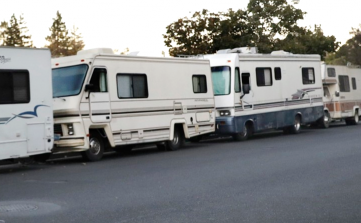
By the Daily Post staff
A ban on parking RVs and other oversized vehicles on Mountain View streets could go into effect as soon as Dec. 18, a week before Christmas.
City Council will meet Dec. 8 to decide what it will do after voters approved Measure C, which bans RVs and other oversized vehicles on 110 miles of city streets.
Measure C passed with 56.5% of the vote in the Nov. 3 election.
Council is scheduled to certify the local election results at the Dec. 8 meeting. If that happens, the ban could go into effect as soon as Dec. 18, according to a statement from the city.
Opponents of the ban have argued that the RVs are being occupied by people who can’t afford the city’s rents.
The city’s statement answered a number of questions people have raised about the ban, such as:
Q: The measure only applies to “narrow” streets. What’s a narrow street?
A: Any street that’s 40 feet wide or less.
Q: Mountain View has 140 miles of city streets. How many miles are considered narrow?
A: About 110 miles, or 78.6%.
Q: What is the definition of an oversized vehicle?
A: Any vehicle, or combination of connected vehicles, which exceeds 22 feet in length or 7 feet in width or 7 feet in height, such as recreational vehicles, boats and large trucks.
Q: Are there exceptions to what the city considers an oversized vehicle?
A: Yes, it would generally exclude passenger vans and pickup trucks. Also OK are wheelchair-accessible vans with a valid placard or license, oversized vehicles that are parked for a short time, such as during loading and unloading, and emergency vehicles.
Q: Would the city have to wait on issuing tickets until signs are installed on all 110-miles of narrow streets?
A: No, cops can begin ticketing on any street that has signs.
Q: Which neighborhoods will get signs first?
A: Officials plan to reveal that piece of information at the Dec. 8 meeting.

This will just send these motor homes to Palo Alto, where the police don’t enforce the 72-hour parking limit. Take a look at the long line of motor homes in front of Stanford on El Camino.
And where does the human waste go?
I find it hard to believe that not a single one of the real estate developers who have profited so handsomely off their local land holdings can’t spare a few acres of land to build a suitable lot for these RV homes. Beyond the fact that it’s the right thing to do, it would be a fantastic PR move and would also set up a great model for other U.S. cities dealing with the same problem.